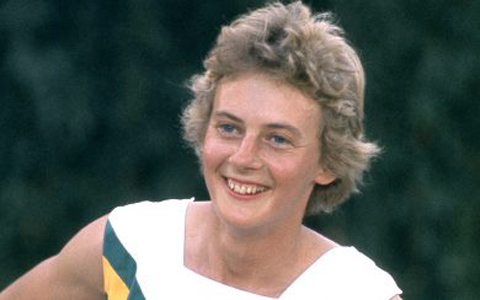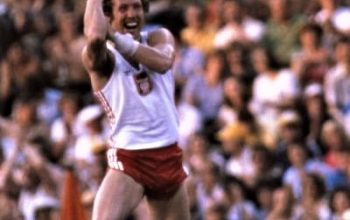The Golden Girl, aged 79, has died after a long battle with multiple sclerosis. Betty Cuthbert’s achievements are well remembered in Australia, but she has never been celebrated as an Olympic hero, a member of the exclusive club of athletes whose names become synonymous with a particular Olympic Games. It was Jesse Owens in Berlin in 1936 and Emil Zátopek in Helsinki in 1952. But not Betty Cuthbert in 1956. Why not? To answer that question it is necessary to understand what makes an Olympic hero.
Olympic heroes tower above mere champions who break records and win gold medals, because new champions will appear at the next Olympics and the one after, and they will create new records and win more medals. Olympic heroes are eternal, honoured in the pantheon located on the summit of Mount Olympus.
There is no simple formula on how such heroes are chosen. It is more than the number of gold medals they win or world records they smash; they are athletes whose feats excite the imagination, who inspire and who personify the Olympic spirit.
In Melbourne, in 1956, there were a number of candidates for the hero of the Games were . Sports Illustrated identified two lead contenders. Vladimir Kuts won gold medals in the 5,000 and 10,000 metre races, setting Olympic records in both. Also vying for the honours was US sprinter, Bobby Morrow. He won gold medals in the 100 m, 200 m and 4 x 100 m, setting a world record in the relay.
The two candidates were enthusiastically supported by their compatriots, and pitting the US against the USSR, neatly fitting into the Cold War rivalry that pervaded many newspaper reports on the Games.
The consensus was that Kuts was the worthy winner of the title. In the Sydney Morning Herald, Gavin Souter wrote that Kuts was ‘the outstanding athlete of the 1956 Games.’ Journalists elsewhere agreed.
At first glance, it is not obvious why Betty Cuthbert was not in the running. She won three gold medals. In the wake of Cuthbert’s victories it is worth asking the question why she was unworthy of being named the hero of the Olympic Games rather than Kuts. After all she had won three gold medals to his two. In addition she set an Olympic record in the 100 metres race, she broke the world record in the 200 metres and was part of the relay team than broke the world record in the 4 x 100 metres.
Cuthbert’s achievements were even more admirable when you consider she came up against the East German champion, Christa Stubnick, who was the world record holder, and Cuthbert beat her in all three races. Stubnick was a professional in all but name, and under the communist sports system she was employed by the secret police, but given ample time to train. Betty Cuthbert was a true amateur, like most Australian athletes of the day, and trained in her spare time, usually after spending the day working in her father’s nursery. Her coach, June Ferguson, was part-time, while Stubnick’s coach, Max Schommler, was a professional trainer with the Dynamo sporting club.
She was a wonderful athlete to watch. Graceful, with her mouth agape and her short blonde locks flying she broke the white tape
A quick survey of the newspaper coverage of Betty Cuthbert after her wins shows why the best she could hope for was being hailed as the ‘Golden Girl,’ while Kuts was allowed to scale the summit of Olympus as one of its greatest heroes. While profiles of Kuts covered his war experiences and then his struggles against the odds to become a world class athlete, articles on Cuthbert dwelt on the domestic rather than on her remarkable athletic feats. An article in The Age, heralding an earlier 100 metres win, mentioned she liked to look after budgerigars before writing about her win. Few people are likely to see caregivers for 70 budgerigars as heroes. The overseas coverage was no better. In the British Daily Express there was a photograph of a grinning Cuthbert with the caption remarking, ‘more woman, less superwoman.’ And Life magazine, described Cuthbert as a ‘pert 18-year-old blonde,’ who ‘ran with a man’s all-out drive and after her first victory had a good, girlish cry.’ No way could a Olympic hero been seen weeping for joy.
With the benefit of hindsight, and in an age when such clear sexism offends, it is time to declare Betty Cuthbert the true hero of the 1956 Olympic Games.



